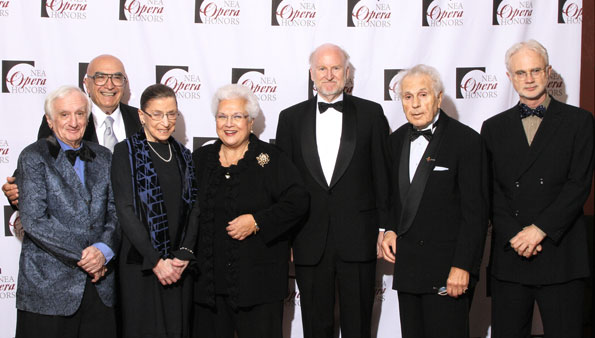
Frank Corsaro, Lotfi Mansouri, Justice Ruth Bader Ginsburg, Marilyn Horne, NEA Chairman Rocco Landesman, Julius Rudel, and John Adams. Photo by Henry Grossman.
Hardly sartorially challenged in blue and black alligator cowboy boots worn with his tuxedo – something of a trend these days – he did a star turn introducing Supreme Court Justice Ruth Bader Ginsburg, who spieled off opera scenes laden with legal themes. Then it was on to the program’s heart: tributes (a la Kennedy Center Honors) for the performing artists with guest presenters and film clips, plus fine solo entertainers of song, under the command of co-hosts Brian Stokes Mitchell and Denyce Graves.
The honorees, who got rousing receptions from a full house primed by the free ticket distribution in October, were composer John Adams, director Frank Corsaro, mezzo-soprano Marilyn Horne, conductor Julius Rudel, and manager Lotfi Mansouri(best known as the inventor of supertitles that allow opera-goers to follow foreign language works in their native tongue).
“Art works – sometimes when you least expect it,” Mr. Landesman said at the start. Clearly it worked that night to remind the public of opera’s power to reach out and connect to people everywhere in different ways. Nor should anyone worry about the old canard that the art form appeals only to oldsters and elitists. Electronics are an important new force that is a key influence, Marilyn Horne commented in private. “Kids [in the business] talk about having to be HD ready,” she marveled and laughed when she noted “They are honoring us to be old enough to get awards.”
John Adams put down such talk succinctly, saying he couldn’t afford to go to operas when he was young and that it is no different now. Mr. Mansouri, the only non-native in the group, was equally upbeat in another way. “Opera finally is getting recognized in America now that it is no longer ‘Euro-centric,’ he said. “And all of us were delighted that NEA has professional persons who understand all of our pains.”
